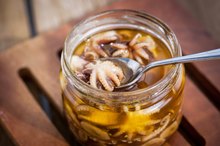What does fact checked mean?
At Healthfully, we strive to deliver objective content that is accurate and up-to-date. Our team periodically reviews articles in order to ensure content quality. The sources cited below consist of evidence from peer-reviewed journals, prominent medical organizations, academic associations, and government data.
The information contained on this site is for informational purposes only, and should not be used as a substitute for the advice of a professional health care provider. Please check with the appropriate physician regarding health questions and concerns. Although we strive to deliver accurate and up-to-date information, no guarantee to that effect is made.
List of Foods With Essential Fatty Acids
Omega-3 fatty acids and omega-6 fatty acids are called essential because they must be obtained from the foods you eat 1. Both groups are healthy unsaturated fats that lower your risk of developing cardiovascular disease and fill other vital roles in your body. You can get these essential nutrients from some foods and several types of vegetable oils.
Essential Fatty Acids
The omega-3 and omega-6 fatty acids help prevent cardiovascular disease by lowering cholesterol. They're essential for the proper functioning of your brain, nerves and cells throughout body. They also help regulate the inflammatory response. Two of the essential fatty acids must come from your diet; your body uses them to make three more 1. The essential omega-3 is alpha-linolenic acid, or ALA. You also need to consume the omega-6 called linoleic acid, or LA. Women need 1.1 grams of omega-3 and 12 grams of omega-6 daily. Men should get 1.6 grams of omega-3 and 17 grams of omega-6 daily.
- The omega-3 and omega-6 fatty acids help prevent cardiovascular disease by lowering cholesterol.
- You also need to consume the omega-6 called linoleic acid, or LA.
Oily fish
How Much EPA & DHA Are in Chia Seeds?
Learn More
Two of the omega-3 fatty acids -- eicosapentaenoic acid, or EPA, and docosahexaenoic acid, or DHA -- come from oily fish. Even though they can be synthesized from ALA, your body may not produce an adequate amount, according to the Linus Pauling Institute 1. The best sources include salmon, sardines, mackerel, tuna and freshwater trout. The American Heart Association recommends eating oily fish twice weekly. If you don’t consume enough fish, you can take fish oil supplements. A recommendation for fish oil has not been established, but patients with coronary heart disease are advised to take 1 gram of combined EPA and DHA daily.
- Two of the omega-3 fatty acids -- eicosapentaenoic acid, or EPA, and docosahexaenoic acid, or DHA -- come from oily fish.
- A recommendation for fish oil has not been established, but patients with coronary heart disease are advised to take 1 gram of combined EPA and DHA daily.
Vegetable Oils
Plant-based oils contain the essential fatty acids ALA and LA 1. Safflower, sunflower, corn, soybean and sesame oils are good sources of omega-6 fatty acids. One tablespoon of these oils contains 6 to 10 grams of omega-6, which is 50 to 83 percent of women’s and 35 to 58 percent of men’s recommended daily intake. A 1-tablespoon serving of walnut oil and canola oil has more than 1 gram of omega-3. Flaxseed oil is an even better source, with more than 7 grams of ALA per tablespoon.
- Plant-based oils contain the essential fatty acids ALA and LA 1.
- A 1-tablespoon serving of walnut oil and canola oil has more than 1 gram of omega-3.
Nuts and Seeds
Does Sole Contain Omega-3 Fats?
Learn More
Like vegetable oils, the types of essential fatty acids you get from nuts and seeds are ALA and LA 1. Sunflower seeds, pine nuts, pecans and Brazil nuts have 6 to 10 grams of omega-6 in a 1-ounce serving. Two good sources of omega-3 fatty acids are walnuts and flaxseeds. Both sources contain at least 100 percent of your recommended daily intake. A 1-ounce serving of walnuts supplies 2.6 grams of ALA, while 1 tablespoon of ground flaxseeds has 1.6 grams.
- Like vegetable oils, the types of essential fatty acids you get from nuts and seeds are ALA and LA 1.
- Sunflower seeds, pine nuts, pecans and Brazil nuts have 6 to 10 grams of omega-6 in a 1-ounce serving.
Related Articles
References
- Linus Pauling Institute: Essential Fatty Acids
- Harvard Health Publications: Fats Resource Center
- University of Maryland Medical Center: Omega-6 Fatty Acids
- Circulation: American Heart Association Scientific Statement: Diet and Lifestyle Recommendations Revision 2006: Other Dietary Factors That Affect CVD Risk
- None
- None
- None
- None
- None
- None
- None
- None
- None
- None
- None
- None
- None
- None
- None
- None
- None
- None
- None
- None
- None
- None
- None
- None
- None
- None
- None
- None
- None
- None
- None
- None
- None
- None
- None
- None
- None
- None
Resources
Writer Bio
Sandi Busch received a Bachelor of Arts in psychology, then pursued training in nursing and nutrition. She taught families to plan and prepare special diets, worked as a therapeutic support specialist, and now writes about her favorite topics – nutrition, food, families and parenting – for hospitals and trade magazines.









